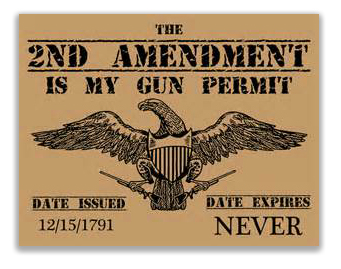We post news and comment on federal criminal justice issues, focused primarily on trial and post-conviction matters, legislative initiatives, and sentencing issues.

BEGINNING OF THE END FOR 18 USC 922?
 A remarkable district court decision from Western District of Texas last week held that 18 USC § 922(n), a subsection that prohibits people who are under indictment from possessing guns or ammunition that have traveled in interstate commerce, is unconstitutional.
A remarkable district court decision from Western District of Texas last week held that 18 USC § 922(n), a subsection that prohibits people who are under indictment from possessing guns or ammunition that have traveled in interstate commerce, is unconstitutional.
District Judge David Counts dismissed an 18 USC § 922(n) charge against Jose Quiroz, who was facing a Texas burglary indictment when he tried to buy a .22-caliber version of the Colt Model 1911 handgun.
In a 25-page opinion filed in Pecos, Texas, Counts ruled that in the wake of the Supreme Court’s June decision in New York State Rifle & Pistol Ass’n, Inc. v. Bruen, despite “valid public policy and safety concerns,” the statute had to be considered under a historical analysis alone. He held that “[a]lthough not exhaustive, the Court’s historical survey finds little evidence that § 922(n) — which prohibits those under felony indictment from obtaining a firearm — aligns with this Nation’s historical tradition. As a result, this Court holds that § 922(n) is unconstitutional.”
 The Court said that the “Second Amendment is not a ‘second class right.’ No longer can courts balance away a constitutional right. After Bruen, the Government must prove that laws regulating conduct covered by the Second Amendment’s plain text align with this Nation’s historical tradition.”
The Court said that the “Second Amendment is not a ‘second class right.’ No longer can courts balance away a constitutional right. After Bruen, the Government must prove that laws regulating conduct covered by the Second Amendment’s plain text align with this Nation’s historical tradition.”
What makes the decision interesting is not just the detailed historical analysis that argues against the constitutionality of § 992(n). In addition, the decision casts substantial doubt on whether 18 USC § 922(g) – which prohibits people convicted of felonies from possessing guns or ammo – is still constitutional in light of Bruen.
Bruen held that “when the Second Amendment’s plain text covers an individual’s conduct, the Constitution presumptively protects that conduct. To justify its regulation, the government… must affirmatively prove that its firearms regulation is part of the historical tradition that delimits the outer bounds of the right to keep and bear arms….”
 Judge Counts reviewed the history of laws prohibiting felons from possessing guns: “By the mid-1920s, only six states had laws banning concealed carry by someone convicted of a crime involving a concealed weapon. And zero states banned possession of long guns based on a prior conviction… Whether this Nation has a history of disarming felons is arguably unclear—it certainly isn’t clearly “longstanding.” And what’s even more unclear—and still unproven—is a historical justification for disarming those indicted, but not yet convicted, of any crime.”
Judge Counts reviewed the history of laws prohibiting felons from possessing guns: “By the mid-1920s, only six states had laws banning concealed carry by someone convicted of a crime involving a concealed weapon. And zero states banned possession of long guns based on a prior conviction… Whether this Nation has a history of disarming felons is arguably unclear—it certainly isn’t clearly “longstanding.” And what’s even more unclear—and still unproven—is a historical justification for disarming those indicted, but not yet convicted, of any crime.”
The Quiroz opinion is only a district court holding and is not binding precedent on other courts (even in its home 5th Circuit). However, the decision is written with detail that is extraordinary for a district court case and may have a lot of persuasive authority for other district courts (and even courts of appeal). The case also suggests that Bruen, only three months old, could have a major effect on 18 USC § 922.
Even before Bruen, Supreme Court Justice Amy Barrett – when she was still on the 7th Circuit – argued in her dissent in Kanter v. Barr that the felon-in-possession statute could not constitutionally applied to people with nonviolent felony convictions:
History is consistent with common sense: it demonstrates that legislatures have the power to prohibit dangerous people from possessing guns. But that power extends only to people who are dangerous. Founding-era legislatures did not strip felons of the right to bear arms simply because of their status as felons… In 1791 — and for well more than a century afterward — legislatures disqualified categories of people from the right to bear arms only when they judged that doing so was necessary to protect the public safety.
Anyone filing direct appeals or post-conviction motions in cases where they were convicted of 18 USC § 922 offenses should seriously consider raising a constitutionality issue in light of Bruen.
United States v. Quiroz, Case No 22-cr-00104, 2022 U.S. Dist. LEXIS 168329 (W.D.Tex., September 19, 2022)
New York State Rifle & Pistol Ass’n, Inc. v. Bruen, 142 S. Ct. 2111, 213 L. Ed. 2d 387 (2022)
Associated Press, Judge holds gun ban for felony defendants unconstitutional (September 19, 2022)
Sentencing Law and Policy, District Court declares § 922(n), which criminalizes a person under indictment from receiving a firearm, to be unconstitutional (September 20, 2022)
Kanter v. Barr, 919 F.3d 437 (7th Cir., 2019)
– Thomas L. Root

